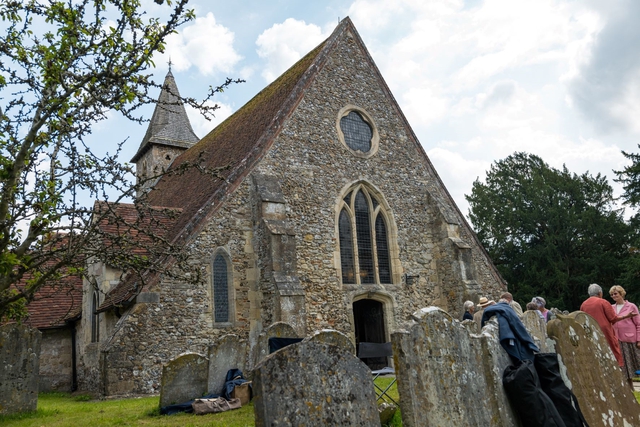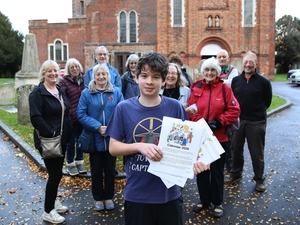
The Diocesan Advisory Council for the Care of Churches
Here you will find information, resources and documents from the DAC:
Diocesan Advisory Committee and the Faculty system
Under the Ecclesiastical Exemption Rules, churches are outside of the control of local authority planning for works which do not alter the external appearance of the building. In place of this each diocese has a diocesan chancellor who grants permission for the works to take place. He is advised by a DAC (Diocesan Advisory Committee for the Care of Churches) which looks at these works in detail and offers guidance on each proposal to the chancellor (or the Archdeacon for List B cases). Therefore any repair, alteration, extension, disposal or new addition needs to receive approval, this covers the church, attached halls, churchyards and fixed contents. Significant alternations to the external appearance will require both faculty and planning permission.
The faculty system involves three levels of permission:
- Level A: minor works that need to be logged but don’t need any formal permissions.
- Level B: general like for like repairs, maintenance and changes that don’t affect the fabric.
- Faculty: All other works.
What is in List A and List B changed on 1 July 2022, as you can see from here.
The DAC committee
The committees aim is to protect church buildings as part of our national heritage but also to help parishes have functioning buildings that enable worship and mission. In addition to the Chair and three Archdeacons, the members include architects, two Synod members, representatives from a local authority, Historic England and an amenity body and local clergy and laity representatives. There are also specialists in areas such as bells, clocks, archaeology, heating/lighting; some of these sit on the committee and other specialists feedback into the casework of the committee.
The full DAC committee meets 10 times a year to discuss submitted faculty works, site visits and any correspondence or advice requested from parishes. See dates below.
| 2026 | Agenda Close | Meeting |
| February | 02/02/2026 | 12/02/2026 |
| March | 02/03/2026 | 12/03/2026 |
| April | 07/04/2026 | 16/04/2026 |
| May | 05/05/2026 | 14/05/2026 |
| June | 01/06/2026 | 11/06/2026 |
| July | 29/06/2026 | 19/07/2026 |
| September | 24/08/2026 | 03/09/2026 |
| October | 28/09/2026 | 08/10/2026 |
| November | 02/11/2026 | 12/11/2026 |
| December | 30/11/2026 | 10/12/2026 |
DAC membership
The membership of the DAC includes local clergy, specialist advisers in various areas of building work, and representatives of various heritage and public bodies. They are appointed by Bishop’s Council who ensure members have knowledge of church buildings and their history, CofE liturgy and worship, knowledge of architect, and experience in the care of church buildings and their contents.
Newer members (those appointed since 2016) are members for a maximum of six years. The full list is as follows:
- Chairman: Giles Chapman
- Archdeacon of Portsdown: Canon Bob White (acting)
- Archdeacon of the Meon: The Ven Kathryn Percival
- Archdeacon of the Isle of Wight: vacant
- Diocesan Synod (clergy rep): The Rev Jude Greenfield
- Diocesan Synod (lay rep): Andrew Minchin
- Local authority rep: Julie Wilkins (Isle of Wight Council)
- Historic England representative: Alistair Hunt
- Amenity Society rep: vacant
- Architect: Tim Sage
- Julian Livingstone
- The Rev David Power
- Ian Smith
- Simon Goddard
- The Rev Mark Williams
- The Rev Richard Hutchins (also heating/AV adviser)
- David Cain (also organs' adviser/vice-chair)
- David Langdon
- The Rev Russell Lawson
Site visits
For any faculty works that involve significant change to the building we recommend that you undertake early consultation about the proposals and major projects will also require ongoing conversations with the DAC. If you would like members of the DAC to undertake a site visit then please do contact us. At site visits members offer informal advice which is then followed up with a report.
National Heritage List for England
Advice and guidance on caring for nationally-designated heritage assets including churches
Architects and Surveyors
Quinquennial inspections
Every parish church (unless exempt) needs to undertake a quinquennial inspection (QI) to ensure the conservation of the fabric. These take place every five years and involve a survey to look at the condition of the church and assess what repairs will be required. This helps to ensure ongoing maintenance and repair work is planned appropriately. To undertake this every church must have appointed a suitably accredited Architect or Surveyor. They will undertake the survey and can also then assist and advise on works pertaining to the church in between.
Appointing an architect or surveyor
When making a new appointment, the PCC must seek the advice of the DAC on the proposed candidate to ensure their chosen architect or surveyor is suitably qualified for the age/listing of the building. The DAC Secretary has a list of those currently working within the Diocese – Please click here for the list – and can provide names of other suitable candidates. If the parish wish to appoint an architect or surveyor that is not known by the DAC then the Secretary will arrange an interview and/or request examples of previous relevant work. Please contact the DAC Secretary to discuss any of this process further.
See this link for general guidance and advice from the Church of England on this.
See the following link for arrangements for the Quinquennial Inspection within the Diocese of Portsmouth:
Complaints
If you have been involved in faculty proceedings and feels that you have been treated discourteously by the chancellor (or deputy chancellor) or that there has been excessive delay in handling the proceedings, you may wish to make a formal complaint. The procedure for doing so can be found here.


